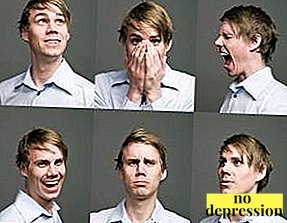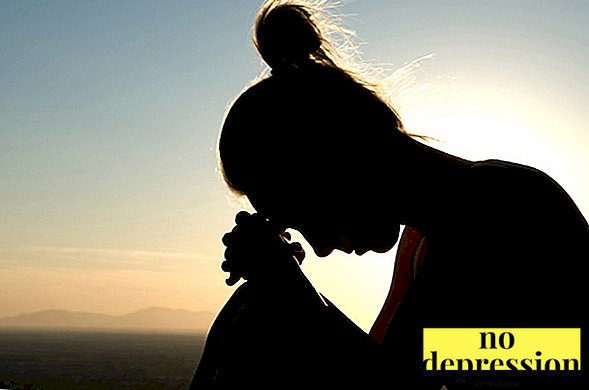Causes of Severe Depression
The cause of severe depression (deep depression) is an individual question for each person. However, some trends are still revealed.
1. Psychological
Such disorders include various traumatic situations and experienced shocks. This is a divorce, and dismissal from work, and the death of a loved one or his serious illness, and many other situations. Such life disasters can seriously affect the mental state of a person.
2. Endogenous
These reasons include a decrease in the body of the patient's content of neurotransmitters serotonin and dopamine. As you know, these substances are responsible for a person's good mood. But some people are predisposed to reduced their content, which automatically makes them on the list of people prone to depression. Exacerbations occur in the fall and spring.
3. Symptomatic
A similar phenomenon in the human body may be caused by a serious illness or a long medication with hormonal replacement therapy and some others.
However, there are a number of factors that indicate a person’s susceptibility to the development of depression. These include genetic, socio-psychological and organic.
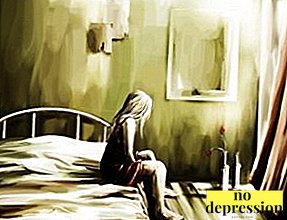 Predisposition to severe depression
Predisposition to severe depression
1. The vast majority of depressive states occur in the body due to internal processes. Severe depression can develop due to the lack of specific substances in the body - monoamines (serotonin, dopamine), affecting the emotions, memory and attention of a person. The lack of monoamines, in turn, is associated with a genetic predisposition.
2. There is a type of people, emotional and vulnerable, but not willing to express their feelings when others are in society. For this type of people is characterized by directness, maximalism, stubbornness, intransigence. If any negative life situation arises: the death of a loved one or friend, a break in relationships, lack of support and understanding, pressure in the team, such a person reacts heavily to what is happening, goes into himself and falls into a severe depression.
3. In addition to the above factors, depression can be a complication of severe somatic diseases, such as stroke, hepatitis, and malignant tumors.
Signs of Severe Depression
Often, severe depression can be recognized on the basis of a combination of several behavioral characteristics:
- regular bad mood, depression
- chronic fatigue, lack of energy
- reaction inhibition
- sleep and appetite disorders
- extremely low self esteem
- sharp changes in weight (we emphasize: a sharp set, or weight loss)
- pessimism
- haunting guilt and anxiety
- occurrence of delusions and hallucinations
- thoughts of suicide
Symptomatology
In order to diagnose a patient with a "deep depression", three symptoms are required:
1. Depressed mood in which the person is most of the daytime. This condition should be in a patient for at least two weeks, and this is the reason for contacting a specialist. In this condition, the patient does not feel satisfaction from those activities that brought joy to depression.
2. Increased fatigue and lack of vitality.
3. Apathy, longing and anxiety.
Psychological manifestations of depression
It is necessary to single out not only the clinical, but also the psychological symptoms of the disease. First, it is hallucinations. Most often, the patient appears auditory and olfactory vision. The patient can hear different voices that reproach him or demand some kind of action from him.
Secondly, various utopian ideas. As such ideas in a patient may be his depravity, guilt in the most unexpected things. A person can be sure that he does not have some internal organs. People may invent non-existent diseases; there may be a premonition of approaching grief.
Third, there is a depressive stupor. In such a state, patients can spend hours in hours, not responding to those who are not responding to questions, paying or seeing in one point. When stupor is characterized by a constrained posture, a depressed expression, a depressed head.
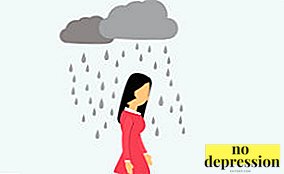 For severe depression
For severe depression
With the development of severe depression, the person is not able to lead the usual, habitual for him vital activity. Indifference to their appearance and state of health appears. The patient does not have internal resources to take care of himself and his relatives. Depression is reflected not only in the patient, but also in his immediate environment. The life of the patient is more like existence. Thoughts are like this: why take a shower and use new clothes? Another time, it will do.
The most dangerous in the presence of severe psychological disorder is the high risk of committing suicide. Therefore, it is very important to give a person the right support at the first signs of depression and consult a psychotherapist. The initial stage of the disease is much easier and faster to cure than the running form.
Treatment of severe depression
If you suspect that a person is depressed, it is imperative that you refer to a specialist, such diseases do not go away by themselves. Treatment of depression includes drug therapy (medication) and psychotherapy. These methods are not interchangeable and are used strictly together.
You can not treat depression on their own, this will not help herbal extracts or lotions. Requires professional treatment. Only a doctor, after examining and interviewing a patient, may prescribe the necessary drugs.
The patient is prescribed antidepressants, antipsychotics and tranquilizers. The first type of drugs is the basis for the treatment of depression. Antidepressants help cure most of the symptoms and return a person to a normal life. Tranquilizers help get rid of anxiety disorders, help normalize sleep. Neuroleptics are also appointed seriously ill in the presence of hallucinations and delusions.
Psychotherapy in the treatment of severe depression contributes to the return of a person to a conscious life. With each session, patients slowly, step by step, treat their psychological trauma. They learn to see again in themselves and in life not only bad and meaningless. Gradually, the desires of something and the ability to cope with psycho-emotional stress are restored.
The treatment of a severe psychological disorder is a very long and serious process, covering more than one month. With noticeable improvements, do not stop treatment. It is important to continue to follow the recommendations of the attending psychotherapist, otherwise there is a high risk of the disease returning.
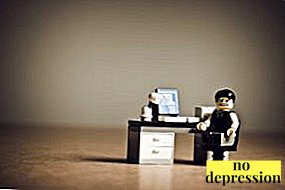 Phases of treatment of depression
Phases of treatment of depression
When treating severe depression, there are three main phases:
1. Phase of active treatment
Lasts one to two months. During this period, the patient shows significant improvements, eliminating most of the symptoms. If you stop the treatment of the disease in this phase, the risk of depression returning is very high.
2. Stabilization Phase
From six months to a year. Treatment continues until the disease retreats. There is no point in quitting treatment, because remission does not mean that the disease will never occur again, especially if there is a predisposition. It is necessary to take medications prescribed by the attending physician, possibly in smaller doses.
3. Phase maintenance treatment
It involves taking medications in the minimum dosage with the gradual abandonment of them. Dramatically stop drug therapy can not. The duration of this phase is determined by the psychotherapist for each patient separately.
It must be remembered that severe depression is a treatable disease. Therefore, it is important to promptly seek the help of a specialist doctor.
Special attention must be paid to the treatment of this disease in children and adolescents. And it is worth repeating again - no need to self-medicate. It is life threatening!

 Predisposition to severe depression
Predisposition to severe depression For severe depression
For severe depression Phases of treatment of depression
Phases of treatment of depression